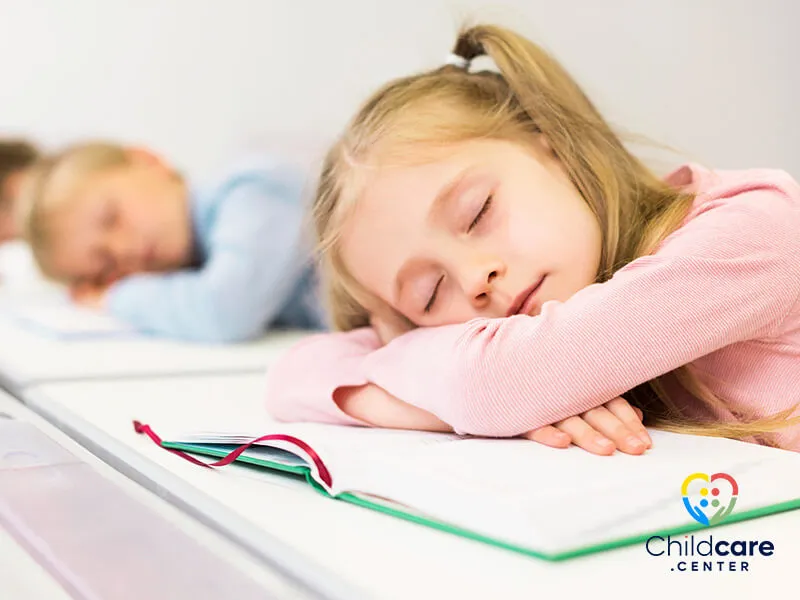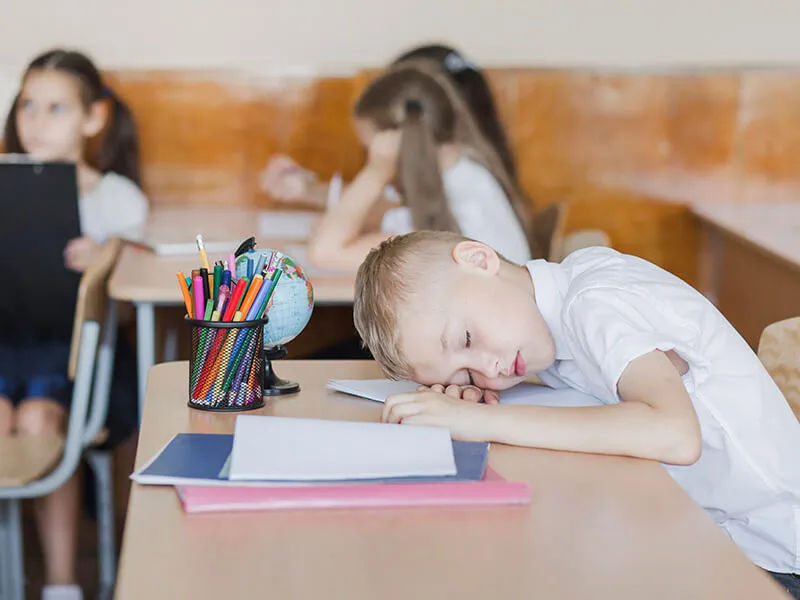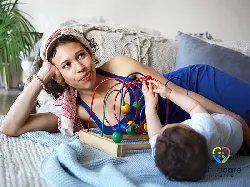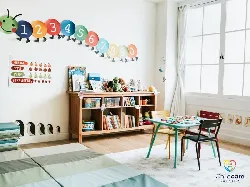How Sleep and Learning in Children Are Connected:What Every Parent Should Know

As parents, our top priority is always the well-being of our children, from their physical health to their academic success. What many of us may not realize is the significant role that sleep plays in a child's learning and overall development. It's not just about avoiding the morning grumpiness or fatigue; quality sleep is a foundational element for cognitive functions like focus, memory, and problem-solving.
Understanding the connection between sleep and learning in children is crucial. It's not merely about getting them to bed on time; it's about ensuring they get the quality sleep needed for optimal brain function. When children are well-rested, they are better equipped to absorb new information, engage actively in classroom activities, and excel in their academic pursuits. In this guide, we'll delve deeper into why sleep isn't just a nightly routine but a critical component for your child's educational success.
The Vital Connection Between Sleep and Learning in Children
Understanding the vital connection between sleep and learning in children is essential for parents who aim to support their child's academic growth. Adequate sleep is not merely a matter of rest; it plays a crucial role in cognitive functions such as memory, attention, and problem-solving. When children receive the recommended amount of sleep, they are better equipped to absorb new information, engage in classroom activities, and perform well in tests. Therefore, prioritizing sleep is not just about preventing tiredness; it's about setting the foundation for effective learning.
The Basics Every Parent Should Know
Before diving into complex discussions about sleep cycles or academic performance, it's crucial to understand the basics. Sleep is not merely a 'break' for the brain; it's an active period where essential processes like memory consolidation occur.
For children, this is especially important as their brains are still in a crucial stage of development. A lack of sleep can lead to issues that go beyond yawning and irritability; it can significantly hinder their ability to learn and absorb new information.

The Importance of Sleep for Kids
Sleep is more than just a time for physical rest; it's a critical component of a child's overall well-being and cognitive development. The importance of sleep for kids extends to various aspects of their lives, including emotional stability, immune system function, and most notably, learning capabilities. When children get enough quality sleep, they are more attentive in class, better at problem-solving, and more capable of handling emotional challenges. In essence, good sleep is one of the most effective tools for enhancing learning and development.
The Consequences of Insufficient Sleep on Learning in Children
When children don't get enough sleep, the consequences extend far beyond grogginess and irritability. The CDC offers valuable insights on sleep and its disorders , which can help you understand the risks better. Insufficient sleep can have a direct, negative impact on their learning abilities.
From reduced attention span and difficulty in concentrating to impaired memory and problem-solving skills, the ripple effects are significant. Moreover, chronic sleep deprivation can lead to mood swings and behavioral issues, further affecting their academic performance. Understanding these consequences underscores the importance of prioritizing sleep as a key component in children's learning and development.

Signs Your Child Might Be Sleep-Deprived
Recognizing the signs of sleep deprivation in children is the first step toward addressing the issue. Common indicators include frequent yawning, irritability, and a noticeable decline in academic performance. You may also observe changes in their social interactions, such as increased withdrawal or mood swings. These signs are not just temporary inconveniences; they can be early warnings of a deeper problem affecting your child's ability to learn effectively.
What Happens When Children Don’t Get Enough Sleep?
When children don't get the sleep they need, the repercussions are not limited to the next day's mood or energy level. This becomes especially critical during transitional times like the back-to-school season. Lack of adequate sleep can lead to a decrease in cognitive functions like attention, memory, and problem-solving. Over time, this can result in lower grades, decreased participation in class, and even behavioral issues.
As highlighted in 'Back-to-School: Pro Tips for Parents to Ace the Transition,' a smooth transition to the new school year involves more than just new school supplies; it also requires proper sleep. Understanding the long-term impact of sleep deprivation is crucial for parents who want to support their children's academic and overall well-being during these pivotal times.
How Sleep Boosts Learning and Grades
Many parents focus on study techniques, extracurricular activities, and even tutors to help boost their children's academic performance. However, one often overlooked factor that can significantly impact learning and grades is sleep. Adequate and quality sleep enhances various cognitive functions essential for learning, such as memory retention, focus, and problem-solving abilities. When children are well-rested, they can better absorb new information, engage more effectively in classroom discussions, and perform optimally in tests and assignments. Therefore, if you're looking to give your child an academic edge, don't underestimate the power of a good night's sleep.
Easy Tips for a Better Bedtime
Improving your child's sleep quality doesn't have to be a daunting task. With some simple adjustments and a bit of consistency, you can set the stage for a better bedtime that not only ensures restful sleep but also enhances learning and academic performance. From creating a sleep-friendly environment to establishing a calming bedtime routine, these easy tips are designed to make bedtime a breeze for both you and your child.
Setting Up a Sleep-Friendly Bedroom
A sleep-friendly bedroom is more than just a room with a bed; it's a sanctuary that promotes rest and relaxation. Consider factors like lighting, temperature, and noise levels. Dimmable lights or blackout curtains can help signal to your child that it's time to wind down, while a comfortable mattress and breathable sheets can make a world of difference in sleep quality. Even small touches like a white noise machine can help create an environment conducive to restful sleep and, in turn, effective learning.

Helping Children Get a Good Night's Sleep
Ensuring your child gets a good night's sleep involves more than just sending them to bed early. A consistent bedtime routine that includes activities like reading a book, taking a warm bath, or even some gentle stretching can help signal to your child's body that it's time to sleep. Avoid screen time at least an hour before bed, as the blue light emitted from devices can interfere with the production of the sleep hormone melatonin. By adopting these simple practices, you're setting the stage for not just better sleep, but also improved learning and academic success.
Expert Advice You Can Trust
When it comes to your child's sleep and learning, sometimes it's best to turn to the experts for advice you can trust. Teachers and pediatricians have unique insights into how sleep affects learning and can offer valuable tips for parents looking to optimize their child's academic performance. In the following, you'll find trusted advice to help you make informed decisions for your child's well-being.

What Teachers Wish Parents KnewTeachers often observe firsthand the effects of sleep—or the lack thereof—on learning. What they wish parents knew is that a well-rested child is more likely to be attentive, participate in class discussions, and perform well in tests. Teachers also note that children who get adequate sleep tend to have better emotional regulation, making it easier for them to cope with the ups and downs of a typical school day. In essence, sleep is a critical factor that can make or break your child's academic experience. Quick Tips from PediatriciansPediatricians are another reliable source for understanding the connection between sleep and learning. Their quick tips often include maintaining a consistent sleep schedule, even on weekends, to regulate your child's internal body clock. They also recommend avoiding caffeine and heavy meals close to bedtime, as these can disrupt sleep quality. Most importantly, pediatricians emphasize the need for age-appropriate sleep durations, as the amount of sleep needed varies at different stages of childhood. |

Your Role in Your Child's Sleep and Learning
As parents, you play a pivotal role in shaping your child's habits, including those related to sleep and learning. Your involvement doesn't stop at setting bedtimes or helping with homework; it extends to educating your child about the importance of sleep and collaborating with their school to ensure a conducive learning environment.
By taking an active role, you not only contribute to your child's current well-being but also lay the groundwork for their future success, both academically and personally.Here, you'll discover actionable ways to be an active part of your child's sleep and learning journey.
Talking to Your Kids About the Importance of Sleep
Open communication is key when it comes to educating your child about the importance of sleep. Rather than simply enforcing a bedtime, explain why sleep is crucial for their well-being and academic success. Use age-appropriate language and examples to make the concept relatable. For instance, you could liken the brain to a 'battery' that needs recharging through sleep. By making your child an informed participant, you're more likely to see compliance and understanding.
How to Work with Your Child's School
Your role in your child's sleep and learning extends beyond the home and into the classroom. Establish a line of communication with teachers and school staff to discuss any concerns or observations you've made regarding your child's sleep patterns and academic performance. Some schools even have sleep education programs or resources that you can tap into. By collaborating with the school, you're creating a more holistic approach to your child's education, one that includes the critical element of sleep.
Conclusion
In conclusion, the link between sleep and learning in children is too significant to ignore. As parents, our role extends beyond setting bedtimes and helping with homework. It's about creating an environment where our children can thrive—both academically and personally. From recognizing the signs of sleep deprivation to implementing effective bedtime routines, every action we take contributes to our child's success. By prioritizing sleep, we're not just ensuring our children are well-rested; we're setting them up for a lifetime of learning and well-being.








